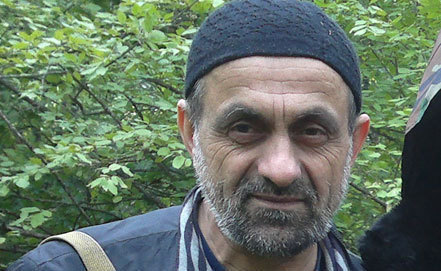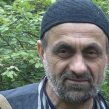
Dagestan Rebel Movement Undergoes Leadership Changes as Radicalization Deepens
Publication: Eurasia Daily Monitor Volume: 9 Issue: 43
By:

The death of yet another Dagestani rebel leader this month passed unnoticed against the backdrop of bloody fighting in the border area between Chechnya and Dagestan last week. Like the killings of previous Dagestani insurgent leaders, the latest killing will have little impact on the general trend in the republic. The new insurgent leader usually starts off with a reshuffle of the top command echelons (first and second naibs, or deputies, and the sector commanders). An oath of allegiance to the leader of the armed resistance, Doku Umarov, is also part of that process.
The Dagestani insurgents promptly officially confirmed death of their leader, Emir Salikh (aka Ibragimkhalil Daudov) (https://vdagestan.com/2012/02/ot-administracii/). On February 10, law enforcement personnel surrounded a house in the village of Gurbuki where Daudov was hiding with his 21-year-old son, Magomedkhabib Daudov, and three other rebels. The emir was wounded, but managed to escape the house, while the other rebels maneuvered to divert the attention of the security forces. The three rebels and Daudov’s son were killed when the security forces stormed the building, (www.kommersant.ru/doc/1873529). Four days later, on February 14, Salikh Daudov’s body was found near Gurbuki by the Gubdenozen River. The rebel emir had died of injuries and hypothermia (https://news.am/rus/news/93508.html). It is likely that Emir Salikh was badly wounded when he fled the surrounded house and thus failed to reach either his base or people who could help him.
The 52-year-old Emir Salikh had entered the resistance movement when he was already well into adulthood, and he lost all of his three sons in the region’s conflict. His wife Zavzhat Daudova died in December 2010, when, according to Russian investigators, she came to Moscow to carry out a suicide bombing in Red Square during New Year’s celebrations and her suicide belt accidently detonated prematurely (https://lenta.ru/news/2012/02/16/candidate/).
The rebel emir of the Central (Mountainous) sector, 35-year-old Rustam Asildarov (aka Mukhammad Abu Usman), was the first naib of Emir Salikh and is one of his possible successors. The emir of the Northern sector, Muaz, who was Salikh’s second deputy, may be another possible candidate for succession as the new emir of the Dagestani front of the North Caucasian resistance movement. However, the succession may go in a different direction, and Doku Umarov could choose any candidate from among the Dagestani rebel emirs. Therefore, other Dagestani rebel leaders, such as Ibragim Gadzhidadaev (aka Ibrahim Gimrinsky), also have a chance to win the leadership position. A two-time European and world champion in the Chinese martial art of wushu-sanda, Gadzhidadaev is one of the most wanted rebels of the Dagestani jamaat. He is a suspect in the murder of Dagestani Interior Minister Adilgerei Magomedtagirov in June 2009 (https://ria.ru/defense_safety/20120218/568783095.html).
It is worth noting that the Dagestani rebels released the notice about their leader’s death quite quickly. The same thing happened in regard to the skirmishes in the border area between Chechnya and Dagestan, when the militants managed to send video recordings from the site of the fighting only five days after they were over. This means that the militants have managed to establish operational communications with the outside world, which is very important for their supporters abroad.
After the death of Rappani Khalilov, the second leader of Dagestan’s Sharia Jamaat, in 2006, the lives of the next seven leaders were quite brief. In practice, few of these leaders presided over the jamaat for more than a year. This is partly explained by the thinking of Russian officials, who assume that the death of the jamaat’s leader will render the jamaat unstable and fragment it, allowing the Russian security services to step up their efforts to crack down on the rebels. However, the jamaat leader’s role is nominal: he is only a facilitator who strives to smooth over any internal conflicts among the insurgents. No one in northern Dagestan will seek permission from the leader in the central Dagestan (Mountainous sector) to stage an attack. Every regional emir in Dagestan is autonomous in his actions.
The jamaat’s influence in the republic is so great that, according to the experts, it is almost no longer possible to talk about reversing that influence. The Russian government’s first reaction to the profound changes in the situation in Dagestan was its decision to virtually stop drafting Dagestanis into the Russian army, something that Dagestani leader Magomedsalam Magomedov complained about earlier this month during a meeting with the deputy commander of the Russian forces in the Southern Military District, Lt.-Gen. Igor Turchinyuk (www.regnum.ru/news/kavkaz/dagestan/1498598.html). Still, Moscow made this decision despite the fact that the Russian army has an enormous lack of conscript soldiers. The outflow of ethnic Russians from Dagestan is also a serious problem (https://moidagestan.ru/news/analytics/3733?PHPSESSID=fcgbbhv4mr9qttfkg4j5ec2qp0). Trying to paint a positive picture of the migration situation in the republic, the Dagestani authorities went so far as to distort the census results (www.regnum.ru/news/kavkaz/dagestan/1497900.html), which allowed them to embellish the figures for various ethnicities – primarily ethnic Russians and Jews. Russians do not feel safe in the republic, where the majority views their future as being part of an Islamic state (https://moidagestan.ru/news/society/13545). Even such a harmless festival as the New Year’s Eve celebration was banned by two-thirds of Dagestan’s schools (https://spectr.info/dle_blogs/716-dagestanu-ded-moroz-ne-nuzhen.html).
Ruslan Gereyev, an expert at the Center for the Study of Islam in the North Caucasus, says that “there is a clear growth in radical Islamist ideas” (https://spectr.info/dle_blogs/713-ekspert-iz-lesa-tak-nikto-i-ne-vyshel.html). This is beyond any doubt now for anyone who is paying attention to this region.
These processes, it must be noted, are not specific to Dagestan. Chechnya, Ingushetia and parts of Kabardino-Balkaria are also in this zone of instability. It is only a matter of time before Karachaevo-Cherkessia joins this group. Claims that the northwestern Caucasus is more predisposed to nationalism than Islamism are poorly grounded, to put it mildly. It should not be forgotten that a person from the northwestern Caucasus, Anzor Astemirov, was one of the founders and the ideologue of the Caucasus Emirate. Nor should it be overlooked that the presence of a Circassian element in the Karachay jamaat forced the rebels to change its name. Ethnic Kabardins are increasingly often becoming leaders of the Kabardino-Balkarian jamaat. It is predicted that the nationalist card will fade away gradually, while Islam will become the most important factor in the ideology of those who oppose Moscow. Dagestan is an absolute leader in the North Caucasus’ radical Islamic movement today.
As pro-Moscow politicians in the North Caucasus try to ensure they are not deprived of funds from the Kremlin and in doing so are prepared to cross all imaginable lines in their respective republics, they are creating a climate of hatred toward the federal center and its puppets in the regions.




